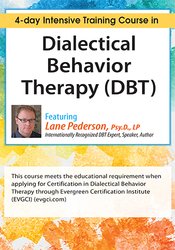
Get immediate lifetime access to this content by purchasing the digital seminar/online course instead that you can access using a variety of devices, and one CE certificate is included with purchase! Click the “Digital Seminar” or "Online Course" link below to learn more!
DVD Purchasers please note: In order to view the content, you will be required to have a DVD player or a DVD drive on your computer. Your CE is a separate fee.

Tags: Multi-Day
Dialectical Behavior Therapy (DBT) has evolved from the go-to treatment for borderline personality disorder to one of the most recognized and sought after therapies for a variety of difficult to treat client problems. The increasing pressure to adopt treatments that work makes DBT skills and strategies a must-have for all types of therapists.
For those who feel that pressure but fear becoming a “manual manic”, relax. Dr. Lane Pederson teaches how to follow the manual yet make thoughtful customizations consistent with evidence-based practices and always grounded in the therapeutic alliance. Covering DBT from theory to clinical application, including the use of diary cards, behavioral analysis, contingency management, and multi-layered validation, this certificate course welcomes those implementing DBT in standard and adapted ways as well as those wishing to simply add DBT skills and techniques to their eclectic or integrative style.
If you have felt limited or stuck with your therapy skills or ready to give up on certain clients, this certificate course will breathe new life into your work. You will leave ready to use the essentials of DBT listed above as well as skills from the Mindfulness, Distress Tolerance, Emotion Regulation, and Interpersonal Effectiveness Modules with your clients, enjoying new confidence in and effectiveness with your clinical skill set.
Lane Pederson Psy.D, LP, is not affiliated or associated with Marsha M. Linehan, PhD, ABPP, or her organizations.
| File type | File name | Number of pages | |
|---|---|---|---|
| Manual - Dialectical Behavior Therapy (DBT) (2.18 MB) | 88 Pages | Available after Purchase | |
| Extras Handouts (0.35 MB) | 96 Pages | Available after Purchase |

Lane Pederson, PsyD, LP, C-DBT, has provided Dialectical Behavior Therapy (DBT) training and consultation to over 30,000 professionals in the United States, Australia, South Africa, England, Canada, Mexico, and the Middle East through his training and consultation company, Lane Pederson and Associates, LLC (www.DrLanePederson.com). A real world practitioner, Dr. Pederson co-owns Mental Health Systems, PC (MHS), one of the largest DBT-specialized practices in the United States with four clinic locations in Minnesota (www.mhs-dbt.com). At MHS, Dr. Pederson has developed DBT programs for adolescents, adults, people with dual disorders, and people with developmental disabilities. He has served as clinical and training directors, has directed practice-based clinical outcome studies, and has overseen the care of thousands of clients in need of intensive outpatient services.
Dr. Pederson’s DBT publications include The Expanded Dialectical Behavior Therapy Skills Training Manual, 2nd Edition: DBT for Self-Help and Individual & Group Treatment Settings (PESI, 2017); Dialectical Behavior Therapy: A Contemporary Guide for Practitioners (Wiley, 2015); Dialectical Behavior Therapy Skills Training for Integrated Dual Disorder Treatment Settings (PESI, 2013) and The DBT Deck for Clients and Therapists: 101 Mindful Practices to Manage Distress, Regulate Emotions & Build Better Relationships (PESI, 2019).
Notable organizations he has trained for include Walter Reed National Military Hospital, the Federal Bureau of Prisons, the Ontario Psychological Association, the Omid Foundation, and Psychotherapy Networker. He has provided DBT training for community mental health agencies, chemical dependency treatment centers, hospital and residential care settings, and to therapists in forensic settings. Dr. Pederson also co-owns Acacia Therapy and Health Training (www.AcaciaTraining.co.za) in South Africa. Dr. Pederson currently serves on the advisory board for the doctorial counseling program at Saint Mary’s University of Minnesota and is a peer reviewer for Forensic Scholars Today.
Lane Pederson is not affiliated or associated with Marsha M. Linehan, PhD, ABPP, or her organization.
Speaker Disclosures:
|
Dialectical Behavior Therapy (DBT): 4-day Intensive Certification Training Course
- Product Code RNV044810 |
Access never expires for this product.
Please Note: Lane Pederson, PsyD, LP is not affiliated or associated with Marsha M. Linehan, PhD, ABPP, or her organizations.
| 5 |
|
| 4 |
|
| 3 |
|
| 2 |
|
| 1 |
|
Satisfaction Guarantee
Your satisfaction is our goal and our guarantee. Concerns should be addressed to: PO Box 1000, Eau Claire, WI 54702-1000 or call 1-800-844-8260.
ADA Needs
We would be happy to accommodate your ADA needs; please call our Customer Service Department for more information at 1-800-844-8260.
PESI Mobile App
Access CE trainings on your phone or tablet through our free mobile app. Choose video or audio-only versions of online courses from the world’s best instructors, and complete your CE requirements anywhere, anytime, at your own pace.
Please wait ...